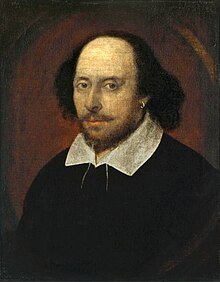Shakespeare's influence
| William Shakespeare | |
|---|---|

The Chandos portrait, artist and authenticity unconfirmed (National Portrait Gallery, London, currently on display at the National Portrait Gallery, Washington, D.C.).
|
|
| Born | baptised 26 April 1564 (birth date unknown) Stratford-upon-Avon, Warwickshire, England |
| Died | 23 April 1616 Stratford-upon-Avon, Warwickshire, England |
| Occupation | Playwright, poet, actor |
|
|
|
| Signature | |
The influences of playwright William Shakespeare extends from theatre and literature to present-day movies, Western philosophy, and the English language itself. He is widely regarded as the greatest writer in the history of the English language, and the world's pre-eminent dramatist. Shakespeare transformed European theatre by expanding expectations about what could be accomplished through innovation in characterization, plot, language and genre. Shakespeare's writings have also impacted a large number of notable novelists and poets over the years, including Herman MelvilleCharles Dickens, and Maya Angelou, and continue to influence new authors even today. Shakespeare is the most quoted writer in the history of the English-speaking world after the various writers of the Bible; many of his quotations and neologisms have passed into everyday usage in English and other languages.
Early Modern English as a literary medium was unfixed in structure and vocabulary in comparison to Greek and Latin, and was in a constant state of flux. When William Shakespeare began writing his plays, the English language was rapidly absorbing words from other languages due to wars, exploration, diplomacy and colonization. By the age of Elizabeth, English had become widely used with the expansion of philosophy, theology and physical sciences, but many writers lacked the vocabulary to express such ideas. To accommodate, writers such as Edmund Spenser, Sir Philip Sidney, Christopher Marlowe and William Shakespeare expressed new ideas and distinctions by inventing, borrowing or adopting a word or a phrase from another language, known as neologizing. Scholars estimate that, between the years 1500 and 1659, nouns, verbs and modifiers of Latin, Greek and modern Romance languages added 30,000 new words to the English language.
...
Wikipedia
